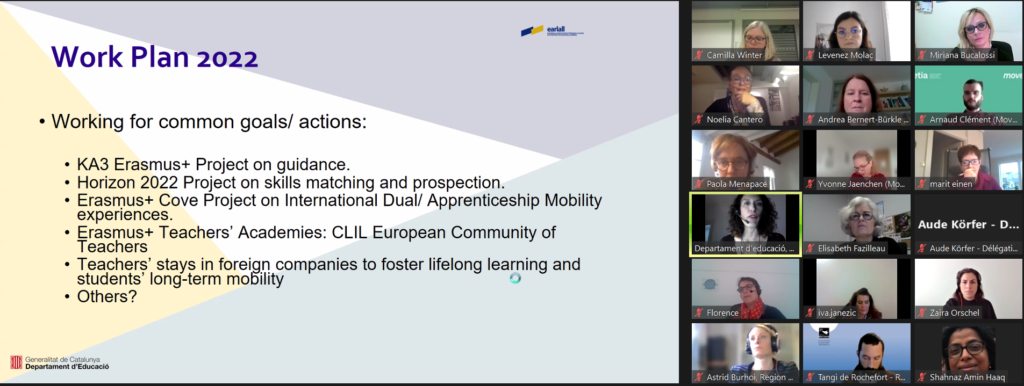EARLALL relaunched its Working Groups
15/12/2021

On 14 December 2021, EARLALL hold a meeting to celebrate the re-launch of its five Working Groups. A call for membership to the Working Groups was organized during the summer and EARLALL members were contacted to express their interest to join the different Working groups:
- Ageing Population and Lifelong Guidance
- Mobility
- Youth Policies
- Skills and Labour Market
Noelia Cantero, EARLALL Director, introduced the meeting by explaining that the re-launch of the Working Groups was an initiative by the leaders of the Working Groups. She reminded that the aim of the Working Groups is to share information (from EU but also from the regions), build project ideas and participate in joint projects and organize events among others. Participation in the WGs is still open to any EARLALL member that would be interested in joining. She highlighted that the WGs work together and regular meetings are organized with the leaders to learn about what the other groups are doing.
Levenez Molac, Project & Communication Officer at EARLALL, presented the new EARLALL Teams platform that will be the new working place of the working groups. She gave “a tour” inside the platform and explained its functioning.
After that, each of the Working Group leaders presented the objectives and activity plans for 2022. Andrea Bernet-Bürkle (Baden-Württemberg) leader of the working group for ageing societies and lifelong guidance gave an overview of the projects in which the working group is or was involved: Bridge+, RegALE, NEET for NEETs and Erasmus+ KA1 Echanges and trainings. Some of the activities planned for 2022 are:
- Project proposals ERASMUS+ KA2 and maybe KA3
- Lifelong guidance 5.0
- Two more projects of EARLALL members in planning phase
- ERASMUS+ KA1 exchanges and trainings
- In the framework of the RegALE project
- BRIDGE+ concept
- ERASMUS+ KA1 exchanges on ageing societies
Then, Camilla Winter, (Borås Municipality, on behalf of Västra Götaland region), leader of the working group for mobility presented the projects in which the working group is involved: TCL, DAMAS, RegALE and the NEETs for NEETs (starting in 2022). The objectives and work of the working group for the year 2022 are:
- Thematic areas
- Skills at the core of the green and digital Transition
- Vocational Education and Training (VET), skills ecosystems and
quadruple helix1- Erasmus+ European Platform to promote Mobility and Internationalisation of VET systems
- Adult learning and education (ALE) to build resilient regions
- Online workshop: EU tools to support LLL – deeper learning
- Promote SSP – Small Scale Partnerships for new comers
After that, Maria Pascual (Department of education of the government of Catalonia) working group leader for skills and labour market presented first the objectives of the working group. Then, she presented the current projects in which the working group was or is involved, including the Boost for CLIL, the Stride for Stride and the Damas project. The Work Plan 2022 for the skills and labour market working group consist of:
- Getting to know the needs of the regions
- Working for common goals:
- KA3 Erasmus+ Project on guidance
- Horizon 2022 Project on skills matching and prospection
- Erasmus+ Cove Project on International Dual/ Apprenticeship Mobility experiences
- Erasmus+ Teachers’ Academies: CLIL European Community of Teachers
The last one to deliver a presentation was Miriana Bucalossi (Tuscany region) leader of the working group for youth policies. The project in which the working group is involved at the moment in the YESpecialists project. The priorities for the year 2022 are:
- Getting to know the needs and committments of the regions and Local Authorities: i.e EAfA, Pact for Skills, Quality Apprenticeships and Traineeships and more!
- Working for common goals:
- Young People at the Heart of the Recovery
- Policy perspective on Quality Traineeships, Social Protection of trainees, startinga discussion around a renewed Quality Framework for Traineeships (after the 2014 Council QFT Recommendation, as stated in the European Pillar of Social Rights Action Plan (March) for 2022)
- Participation in 2022 Year of European Youth: a new workshop on traineeships and the search for decent work experience (ILO)
- Engaging more Regions and Local Authorities in the European Alliance for Apprenticeships
- Young People at the Heart of the Recovery
It was agreed to use the Teams platform for further communication and interaction among members. The working groups will hold meetings every two months and the first ones will be organized in January/early February 2022. Information will be sent from the Working Group Leaders.
Useful documents
- WG for ageing societies and lifelong guidance
- WG Mobility
- WG Skills and labour market
- WG Youth Policies




